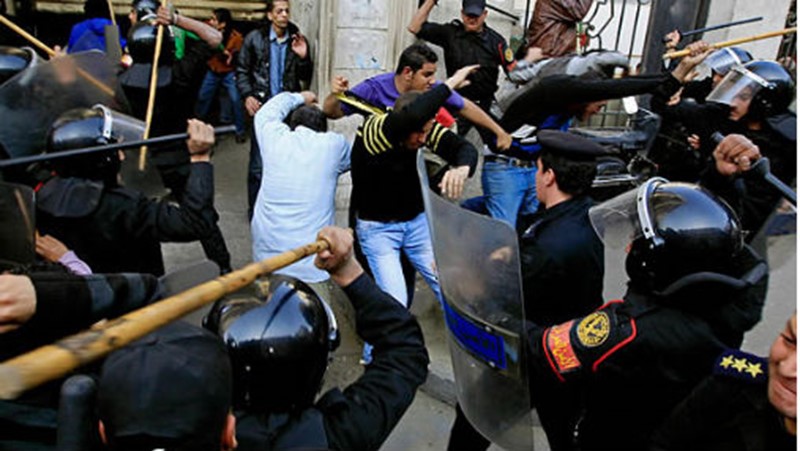
A wave of bomb attacks targeting police hit Cairo on Friday, killing six people on the eve of the third anniversary of the uprising that toppled autocrat Hosni Mubarak and raising fears that an Islamist insurgency is gaining pace in Egypt.
The violence underscored the struggle of authorities to tame militant violence which has increasingly challenged the state since the army toppled Islamist President Mohamed Mursi in July.
In the most high-profile attack, a car bomb exploded at a security compound in central Cairo early in the morning and killed at least four people, including three policemen, security sources said.
They said the blast was the work of a suicide bomber. But footage broadcast on an Egyptian television channel showed a man getting out of a van and moving into another vehicle. Minutes later the van exploded.
Another blast in the Dokki district killed one person. An explosion near a cinema on the road to the Pyramids of Giza on the outskirts of Cairo also led to one fatality.
Clashes in the capital and several other cities between Mursi supporters and security forces which killed 11 people also raised tensions in the biggest Arab nation.
There was no immediate claim of responsibility for the car bomb attack in the parking lot of the Cairo Security Directorate, or the other blasts. But they had all the trademarks of attacks carried out by militants seeking to topple the army-backed government.
Prime Minister Hazem el-Beblawi condemned the bloodshed in a statement, saying it was an attempt by "terrorist forces" to derail the army-backed government's political road map, which is meant to lead to free and fair elections.
Later in the day, a military helicopter flew back and forth over central Cairo, underscoring concerns that another attack could occur at any time.
In Washington, the White House condemned the bombings and urged all sides to avoid violence. "These crimes should be investigated fully and the perpetrators should be brought to justice," spokesman Jay Carney told reporters.
MUBARAK OUSTER ANNIVERSARY
Authorities have been bracing for more violence during the anniversary of Mubarak's fall, when rival political groups are expected to turn out, including supporters of army chief General Abdel Fattah al-Sisi, who ousted Mursi, as well as members of the Muslim Brotherhood and liberals.
The 2011 revolt raised hopes of a stable democracy in the Arab world's biggest nation. Instead, relentless political turmoil has hit investment and tourism hard in Egypt.
In a statement, the office of President Adly Mansour said it would "avenge the deaths of the martyrs" who died at the Security Directorate and severely punish the perpetrators.
Reuters witnesses heard gunfire right after the first blast, which twisted metal and shattered windows of nearby shops. Wood and metal debris was scattered hundreds of meters around.
One body covered in a blanket lay in a pool of blood near a scorched car engine.
State television quoted witnesses as saying gunmen on motorcycles opened fire on buildings after the explosion. The Health Ministry said 76 people were wounded.
The blast also heavily damaged the nearby Islamic Art Museum, an official told the state news agency.
POLITICAL ROAD MAP
After ousting Mursi, Sisi unveiled a political road map he said would bring elections and calm to Egypt.
Security forces have killed hundreds of Brotherhood members and jailed thousands more, including top leaders.
The army-backed government has effectively removed the Brotherhood from politics and many Egyptians turned against it after Mursi's troubled one-year rule.
Intense pressure on the movement has severely hurt its ability to stage mass protests it had hoped would reverse what it calls an army coup that has undermined Egypt's democratic credentials.
But authorities are struggling to contain Islamist militant violence. Militants based in the Sinai have stepped up attacks on security forces since Mursi's fall, killing hundreds.
Attacks in other parts of Egypt have also risen, fuelling fears the country could face an Islamist insurgency similar to one that raged in the 1990s before Mubarak stamped it out.
The Sinai-based Islamist militant group Ansar Bayt al-Maqdis said in December it was behind a car bomb attack on a Nile Delta police compound that killed 16 people and wounded about 140.
On Thursday, gunmen killed five policemen at a checkpoint south of Cairo, the Interior Ministry said.
"TRAITORS AND DOGS"
The police headquarters assault will likely encourage the state to crack down harder on the Brotherhood, which it accuses of terrorist acts. The group says it is a peaceful movement.
Human rights groups accuse security forces of widespread human rights abuses in their crackdown on the Brotherhood. But the group has little sympathy on the street.
The mood was tense at the Cairo Security Directorate. "Traitors and dogs!" yelled onlookers, an apparent reference to the assailants.
People also chanted anti-Brotherhood slogans. "The people want the execution of the Brotherhood. Execution for Mursi," they yelled.
One woman, Wafaa Ahmed, was crying outside the Cairo Security Directorate.
"These people have no sense of loyalty to the nation. This is terrorism, they want to get back at us because we finished them off ...," she said.


